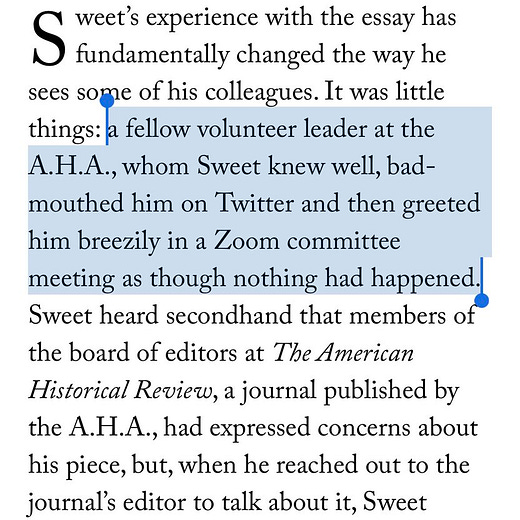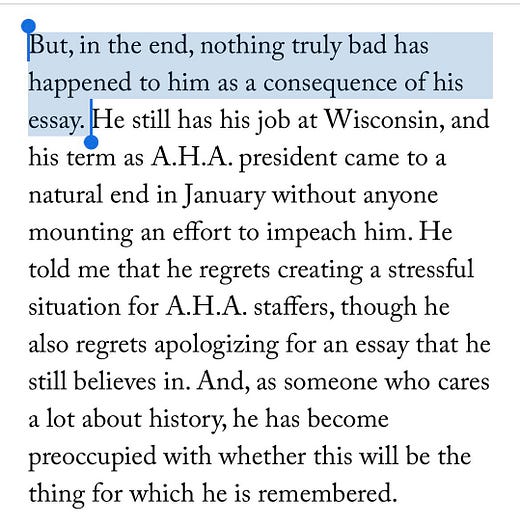E-Pluribus | March 10, 2023
America gets woke - satire hardest hit; we all have a stake in preserving history; and cancel culture - can it be good?
A round-up of the latest and best writing and musings on the rise of illiberalism in the public discourse:
George F. Will: Woke word-policing is now beyond satire
When it comes to words, George Will knows whereof he speaks - and writes. In his latest Washington Post column, Will takes on the English language’s hall monitors who inveigh against those who dare to violate the monitors’ personal politically correct pedantry.
Worse really is better in today’s America (if you will pardon that noun; some at Stanford University will not; read on) as the fever of foolishness denoted by the word “woke” now defies satire. At Stanford, a full-service, broad-spectrum educational institution, an “Elimination of Harmful Language Initiative” several months ago listed words to avoid lest they make someone feel sad, unsafe, disrespected or something. Problematic words include “American,” which suggests that America (this column enjoys being transgressive) is the most important country in North and South America. The list was quickly drenched by an acid rain of derision, and Stanford distanced itself from itself: The university’s chief information officer said the list was not a mandate. The list warns against using the “culturally appropriative” word “chief” about any “non-indigenous person.”
[ . . . ]
Early in the Cold War, some colleges and universities were pressured to require faculty to sign loyalty oaths pledging they were not members of the Communist Party. Liberals honorably led the fight against such government-enforced orthodoxy. Today, liberals are orthodoxy enforcers at the many schools that require applicants for faculty positions to write their own oaths of loyalty to today’s DEI obsession.
[ . . . ]
They must express enthusiasm for whatever policies are deemed necessary to promote “diversity, equity and inclusion.” Fortunately, the Board of Governors of the University of North Carolina recently joined a growing movement to ban requiring DEI statements in hiring and promotion processes, a recoil against aggressive wokeness.
Read the whole thing.
Jennifer Tiedemann: The Future of Historic Preservation: History Matters … But Which History?
While “historic preservation” commonly refers to physical structures, Jennifer Tiedemann, a senior editor at Discourse Magazine, uses the term in a broader sense to discuss the responsibility incumbent on societies to develop and maintain a fair, accurate and comprehensive historical record.
[I]n the messiness of our differences, there is opportunity. Because the issue of the preservation of history doesn’t fall along clearly delineated political lines, it is more difficult for people to retreat to entrenched political camps without actually considering the nuances of the topic. We’re all familiar with the ways in which political polarization drives a wedge between people and inhibits constructive discussion. Historic preservation isn’t immune to debates based on political divides—see the example of James Madison’s Montpelier—but for many aspects of saving our history, there is not the same deep-seated polarization that infects so many other issues.
Sometimes, in fact, preservation can unite a community. A good example is the fate of the well-known “Tillie” mural in Asbury Park, New Jersey. Asbury Park was a flourishing seaside town in the first half of the 20th century, but by the 1970s and 1980s, many of its buildings had fallen into disrepair. One of those buildings, the Palace Amusements indoor amusement park, was home to the Tillie mural.
[ . . . ]
Like it or not, history is not based on an absolute set of facts on which we all agree, and it never has been. It’s comprised of different narratives and varying accounts. And the preservation of history depends upon countless decisions—choices about what to remember, choices about the stories we tell and pass along and, of course, choices about what we choose to save and preserve. As with so many issues today, it’s imperative that we talk with one another in an open-minded fashion to determine what that history ought to comprise. It’s alright if we don’t always agree as long as our disagreements are respectful and constructive.
Read it all here.
Nicholas Grossman: Scott Adams and the Time Cancel Culture Was Good
Scott Adams of Dilbert fame (or infamy, at this point) shot himself and his career in the foot and several more vital areas as well with his recent inflammatory comments on race relations in the United States. Writing at ArcDigital, Nicholas Grossman, who is something of a cancel culture contrarian, says Adams’s case illustrates that cancel culture is in the eye of the beholder and is at times related to wildly differing definitions of cultural “norms.”
As criticism mounted, Scott Adams drew from the familiar rhetorical playbook, claiming to be a victim of “cancelation” who was denied “free speech.”
But Thomas Chatterton Williams, who spearheaded an open letter published in Harper’s that made a liberal, culture-of-free-speech case against what it called an “intolerant climate,” says the response to Adams “is *not* ‘cancel culture.’” When I asked why, he said “cancel culture is really about when someone is called out by a mob for transgressing a not-yet-agreed upon norm” while “Adams just indulged in classic super basic racism.”
That’s a distinction based on newness, and degree of public acceptance. If most people agree some expression is over the line, and have for a while, then harsh reactions are reasonable. Distinguishing Adams’ comments from other expressions people find offensive, Cathy Young, a signatory to the Harper’s Letter, explained that “it's based on overwhelming agreement that the opinion in question is not just wrong but morally reprehensible.”
Agreed upon by whom? And how do we know when a norm crosses the threshold where cutting ties with someone over their public speech becomes appropriate? It has to be well over half to avoid tyranny of the majority. So what level of disagreement renders a norm contested?
Read it all.
Around Twitter
Thomas Chatterton Williams reacts to a New Yorker article which asks the question, “How should historians respond to the urgency of this current political moment?”
Megan McArdle on the Politics of Nasty:
And finally, an editor of a dystopian novel would strike the line “You've said you're engaging in prayer, which is the offense” as too far fetched. And yet, here we are (or, since this is in the U.K., there they are.)










